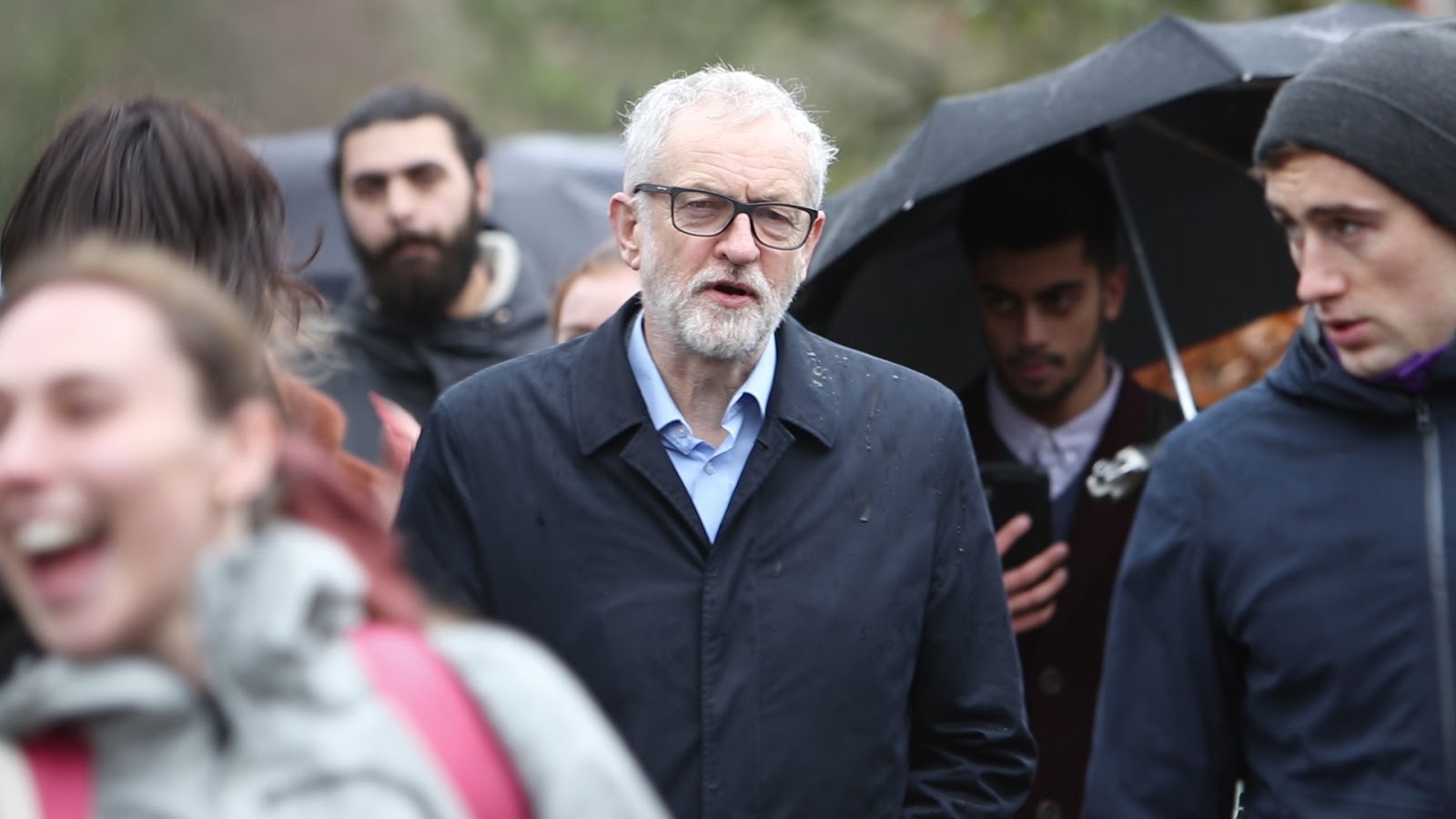By Charlotte King and Sam Tilley
On Thursday 20 February, University College Union (UCU) strike action commenced for the second time during this academic year. The most recent bout of strike action sees UCU members, consisting of university lecturers and postgraduate students, striking for 14 days staggered over the next few weeks.
UCU hosted a strike rally in Alexandria Gardens behind Cardiff University Main Building on the first day of the strike action last week. At the strike rally, Jeremy Corbyn, Labour Party Leader, was in attendance and spoke to the crowd about the latest bout of industrial action and why he is supporting academic staff who have gone on strike this time around.
Corbyn spoke for just over five minutes at the rally before he continued on his tour of the flood-hit communities of South Wales. He made clear that ÔÇ£this dispute by the UCU has [his] full support because university and college lecturers had been very badly treatedÔÇØ and that ÔÇ£what weÔÇÖve seen over those few years has been an attack on wages and conditions and has damaged our whole higher education and further education sector.
ÔÇ£This dispute is about the need for decent pay and conditions and also about the need to protect pensions and to ensure that all new entrants to university and college employment have access to a decent pensions scheme and above all itÔÇÖs about how we treat higher and further education workers across the UK.
ÔÇ£We just fought the general election campaign with the determination to redistribute power and wealth and to give real opportunities all across the UK, the ability to go to university in England without debts of ┬ú60,000 and the ability to enjoy your time at university.ÔÇØ
He closed his message by noting that ÔÇ£we stand here in the tradition of many others demanding all of that and I am proud to give you that message and support on behalf of the Labour Party.ÔÇØ
Other speakers were also in attendance, comprised of various UCU members and academic staff.
Following the strike rally last Thursday, Xpress Radio interviewed Andy Williams and Catherine Walsh, two UCU representatives and academic staff members at Cardiff University to speak about why UCU members have gone on strike for the third time in three years.
ÔÇ£We are facing a perfect storm of problems in a crisis-hit higher education sector in the UKÔÇØ, Williams said.┬á
Discussing pensions, Williams commented: We are fighting for the right to retire with dignity. Speaking about UCUs other causes for the strike in protest against high workloads, casualisation, and the gender and ethnic pay gap, he also stated: Not one of us doesnt know someone who has left the [academic] profession entirely because of high workloads.and its a problem for students, being taught by these burned-out members of staff. Additionally, he stated that the casualisation of contracts is a cancer in the higher education sector with thousands of staff being employed on insecure, fixed-term contracts.
Talking about the success of UCUÔÇÖs strike action, Walsh said that the previous strikes have been extremely successful, temporarily preventing changes to lecturer pension funds. But, this time, she admitted that the strikes are related to issues which ÔÇ£students are on the sharp end of.ÔÇØ
Williams also expressed that UCU members are not ÔÇ£doing this lightlyÔÇØ. When asked about StudentsÔÇÖ Union President Jackie YipÔÇÖs leaked email which stated that the current bout of strike action will prevent some students from being able to graduate at the end of this academic year and whether UCU can justify industrial action in light of this development, Williams said:
ÔÇ£Strikes always have an effect on the people whose services are being disrupted by the strike action…If there were any other way we really wouldnÔÇÖt be doing it. IÔÇÖve seen loads of colleagues in tears about the effects theyÔÇÖre having on students.
ÔÇ£That said, there have been concerns raised about students not graduating and the possibility of further disruption. If there is no resolution to this dispute, if the employers and Vice-Chancellors do not table a reasonable resolution…all that stuff might happen. WeÔÇÖre being re-balloted after this if there is no resolution to the strike.
ÔÇ£We have to be ready for an escalation of these strikes further and if the strike escalates, then itÔÇÖs going to have further effects on students and thatÔÇÖs really regrettable, but itÔÇÖs a potential fact.ÔÇØ
Walsh also commented: ÔÇ£ItÔÇÖs not in my power to say whether or not [students] graduate. Dealing with mitigation is very much on University management. ItÔÇÖs beyond my gift to say who graduates and who doesnÔÇÖt.
ÔÇ£Exam boards are beyond my control…It is the University management, it is their responsibility to first off respond with an offer…and it is their responsibility to decide what happens with their programmes.ÔÇØ
At the strike rally, Gair Rhydd spoke to Joe, a postgraduate student and UCU member taking part in this round of strike action, who encouraged students to put pressure on the University to offer them financial compensation.
Joe told Gair Rhydd that whatever impact the UCU strikes have on students is ÔÇ£the UniversityÔÇÖs responsibilityÔÇØ. Speaking about the plight of postgraduate students, he said that PhD students specifically do a lot of unpaid work in their own time.
ÔÇ£As I look into the future, I see that early career researchers…are mostly on temporary, precarious contracts which are low paid, and it doesnÔÇÖt fill me with hope for my future.ÔÇØ
Much has also been made over the past week of the SUÔÇÖs role in supporting both the UCU strike action and the students affected. Back in November, a motion was put forward and subsequently passed, mandating the SU and the Sabbatical Officers to ÔÇ£stand in solidarity with UCU and publish a public statement of support for 2018/19 action, before the 25th November.ÔÇØ However, there have been concerns amongst certain groups of students about whether or not the SU should repeat this stance for the current batch of strikes. In order to either mandate the SU to issue a public statement for this round of strikes, or to overturn the original motion, an emergency general meeting (EGM) has to be called.
There are three main methods available to try and call an EGM, but the method that James Wallice, President of Cardiff University Conservative Society, has invoked requires him to gain 500 signatures on an online petition in the space of a week. Speaking to Gair Rhydd, Wallice explained his reasons for demanding this action: ÔÇ£It is important that students have a say in whether they support it…itÔÇÖs important to remember that the issues and the impacts of the strike action will be much greater than it was first time round so itÔÇÖs only fair that students have another say on the matter.ÔÇØ Support for the online petition has not been universal however; Cardiff Labour StudentsÔÇÖ President Leo Holmes argued that ÔÇ£personally I donÔÇÖt support it because I don’t think that we need another debate on this, as clearly a democratic decision was made at the AGM to support the strike action and I donÔÇÖt think we need to go back to it again.ÔÇØ
Last week, Cardiff University Vice-Chancellor, Colin Riordan, addressed students to discuss the impacts of strike action, potential effects on graduation, and how students can receive compensation at a Q&A event hosted by the StudentsÔÇÖ Union.
Opening up the event,┬á Riordan made it clear that ÔÇ£I personally, and the University, fully respect the right of staff to take industrial actionÔÇØ and stressed that the current dispute between UCU and UK universities is ÔÇ£by the far most complicatedÔÇØ he had encountered.
Regarding how Cardiff University plans to reinvest money saved from the strikes, Riordan said that firstly, money saved will be used to pay any compensation required, and then funds left over will be given to the Schools they originally came from to be dispersed however they wish. On the topic of graduation, he also commented: ÔÇ£At this stage, weÔÇÖre expecting all of our students to graduate as planned. What you do is hope for the best and plan for the worst.ÔÇØ It was again acknowledged, however, that if the UCU Strike action is extended beyond the current 14 day period, problems will arise.
The Universitys Head of Registry also stated that If you are dissatisfiedyou need to submit a complaint via the new complaints process set up specifically for strike-related complaints.
However, the speaker stressed that the University feels a financial remedy is only one possible outcome of the compensation process since ÔÇÿ50% of tuition fees are spent on things outside of direct teachingÔÇÖ, such as building costs and support services which continue to be available throughout the strike period. Additionally, the University is only accepting complaints regarding strike action which occurred during the current academic year; they are not acknowledging complaints referencing the strike action which occurred in 2018, stating ÔÇ£matters in relation to that have been closed.ÔÇØ





Add Comment